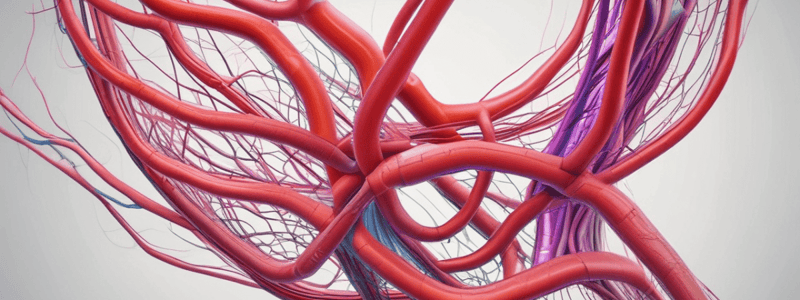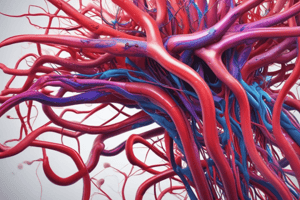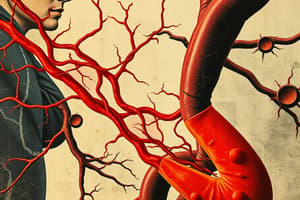Podcast
Questions and Answers
Arteries have thicker walls because they have a thicker layer of ______ cells.
Arteries have thicker walls because they have a thicker layer of ______ cells.
smooth muscle
Veins have ______, which promote the unidirectional flow of low-pressure blood back to the heart.
Veins have ______, which promote the unidirectional flow of low-pressure blood back to the heart.
valves
______ are the areas of most resistance in the vasculature.
______ are the areas of most resistance in the vasculature.
Arterioles
Arteries are able to store pressure due to their ______ walls.
Arteries are able to store pressure due to their ______ walls.
The walls of arteries are composed of smooth muscle tissue and the connective tissue ______.
The walls of arteries are composed of smooth muscle tissue and the connective tissue ______.
Arteries serve as a ______ reservoir.
Arteries serve as a ______ reservoir.
Blood flows from arteries, to arterioles, to ______, to venules, and to veins.
Blood flows from arteries, to arterioles, to ______, to venules, and to veins.
The ______ is the difference in pressure determined by the mean arterial pressure.
The ______ is the difference in pressure determined by the mean arterial pressure.
The ______ is the resistance in the cardiovascular system.
The ______ is the resistance in the cardiovascular system.
______ is the relevant flow coming out of the heart.
______ is the relevant flow coming out of the heart.
The body can increase blood flow in two ways: By increasing the pressure gradient. By decreasing the ______.
The body can increase blood flow in two ways: By increasing the pressure gradient. By decreasing the ______.
Bulk flow refers to the movement of any substance down its pressure gradient, such as air, liquid, or gas. When you blow up a balloon, you create an area of high pressure. If you open the balloon, air will flow out of the balloon. This is an example of ______ flow.
Bulk flow refers to the movement of any substance down its pressure gradient, such as air, liquid, or gas. When you blow up a balloon, you create an area of high pressure. If you open the balloon, air will flow out of the balloon. This is an example of ______ flow.
The heart is the primary organ that produces pressure in the vasculature. Mean arterial pressure is greatest in the arteries and decreases as it flows through the vasculature, particularly at the level of the arterioles. It is lowest in the veins as it returns to the ______.
The heart is the primary organ that produces pressure in the vasculature. Mean arterial pressure is greatest in the arteries and decreases as it flows through the vasculature, particularly at the level of the arterioles. It is lowest in the veins as it returns to the ______.
Liquid moves down a pressure gradient whenever there is a difference in pressure between two locations. The blood in the vasculature is always moving, so we can infer that there is a pressure gradient moving it from areas of high pressure to areas of low pressure. This movement of blood is an example of ______ flow.
Liquid moves down a pressure gradient whenever there is a difference in pressure between two locations. The blood in the vasculature is always moving, so we can infer that there is a pressure gradient moving it from areas of high pressure to areas of low pressure. This movement of blood is an example of ______ flow.
The body can decrease blood flow in two ways: By decreasing the pressure gradient. By increasing the ______.
The body can decrease blood flow in two ways: By decreasing the pressure gradient. By increasing the ______.
The walls of arteries are composed of smooth muscle tissue and the connective tissue ______.
The walls of arteries are composed of smooth muscle tissue and the connective tissue ______.
Arteries have thicker walls because they have a thicker layer of ______ cells.
Arteries have thicker walls because they have a thicker layer of ______ cells.
Veins have ______, which promote the unidirectional flow of low-pressure blood back to the heart.
Veins have ______, which promote the unidirectional flow of low-pressure blood back to the heart.
Blood flows from arteries, to arterioles, to capillaries, to venules, and to ______.
Blood flows from arteries, to arterioles, to capillaries, to venules, and to ______.
Arteries serve as a ______ reservoir.
Arteries serve as a ______ reservoir.
Arteries serve as a ______ reservoir.
Arteries serve as a ______ reservoir.
Arteries are able to store pressure due to their ______ walls.
Arteries are able to store pressure due to their ______ walls.
The ______ is the resistance in the cardiovascular system.
The ______ is the resistance in the cardiovascular system.
Blood flows from arteries, to arterioles, to ______, to venules, and to veins.
Blood flows from arteries, to arterioles, to ______, to venules, and to veins.
Veins have ______, which promote the unidirectional flow of low-pressure blood back to the heart.
Veins have ______, which promote the unidirectional flow of low-pressure blood back to the heart.
The walls of arteries are composed of smooth muscle tissue and the connective tissue ______.
The walls of arteries are composed of smooth muscle tissue and the connective tissue ______.
______ are the areas of most resistance in the vasculature.
______ are the areas of most resistance in the vasculature.
______ is the relevant flow coming out of the heart.
______ is the relevant flow coming out of the heart.
The body can increase blood flow by decreasing the ______.
The body can increase blood flow by decreasing the ______.
Arteries have thicker walls because they have a thicker layer of ______ cells.
Arteries have thicker walls because they have a thicker layer of ______ cells.
Flashcards are hidden until you start studying



